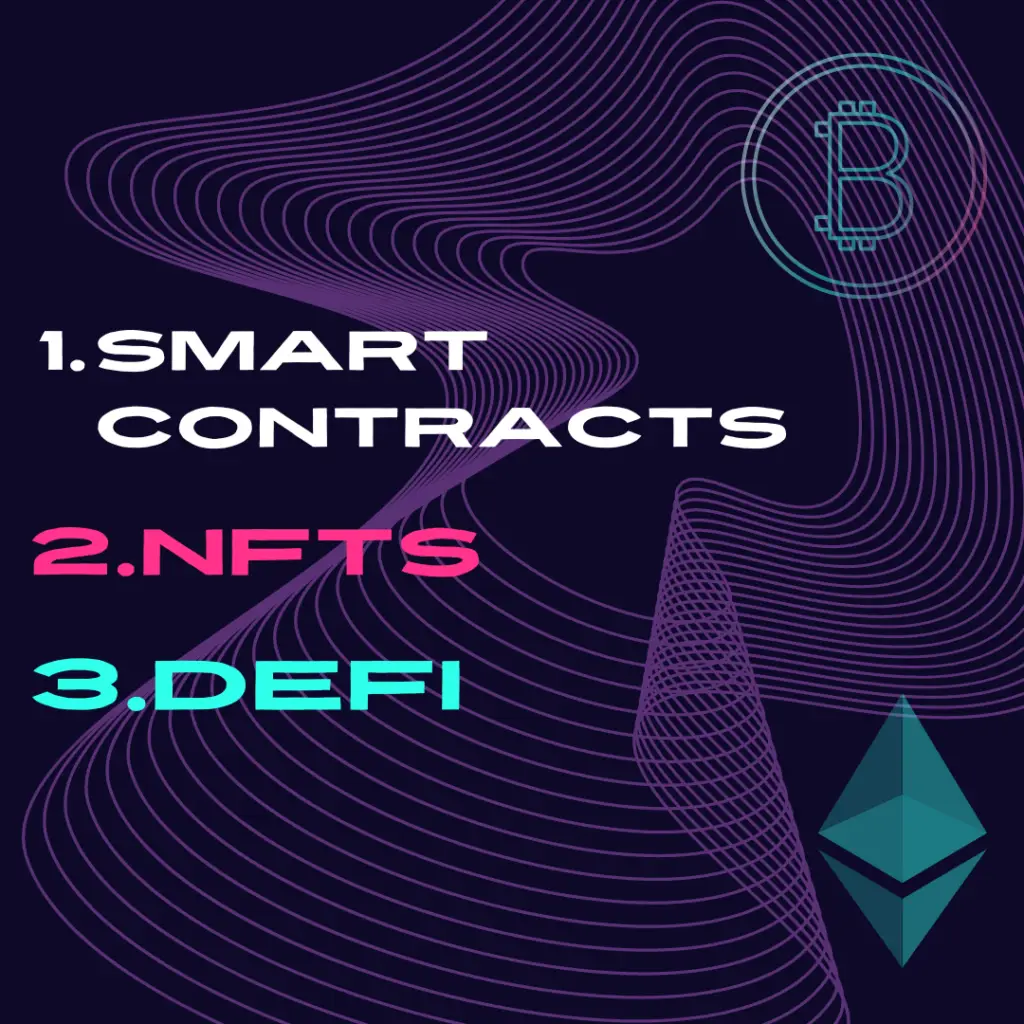Current blockchain applications beyond cryptocurrencies (smart contracts).

What is a Smart Contract and How Does It Work?
Smart Contracts as the name suggests, are self-executing contracts where the terms of the agreement are written directly into lines of code. These contracts are built on blockchain technology, meaning they are decentralized, secure, and tamper-proof. A smart contract automatically enforces the terms of the agreement once the required conditions are met. This technology eliminates the need for intermediaries like lawyers or notaries, offering a more efficient, secure, and transparent way of conducting business.
A smart contract works similarly to a vending machine. Imagine you insert money, select your product, and the machine dispenses it without human interaction. In the same way, a smart contract functions: when certain criteria are met (like inserting money), the contract triggers an action (delivering the product), ensuring both parties get exactly what they agreed upon.
The History and Evolution of Digital Contracts
This concept dates back to the mid-1990s when cryptographer Nick Szabo first coined the term. He envisioned a digital protocol that could automatically enforce agreements without human intervention. However, it wasn’t until the development of blockchain technology, particularly with the advent of Ethereum in 2015, that it became a reality.
Ethereum introduced a platform where developers could build decentralized applications such as DEXIFIER (DApps) and smart contracts, revolutionizing finance and health care industries. Today, blockchain networks like Stellar, Cardano, and Solana have further improved the scalability and functionality of smart contracts, pushing this innovation forward.
Applications of Smart Contracts in Various Sectors
These contracts have found use in a wide range of sectors due to their versatility and security. Some notable applications include:
- Healthcare: In the healthcare industry, smart contracts can automate patient data sharing between hospitals and insurance providers, ensuring both privacy and accuracy. Blockchain ensures that the data is tamper-proof and only accessible to authorized parties.
- Real Estate: Traditionally, real estate transactions involve multiple intermediaries such as agents, lawyers, and notaries. Blockchain agreements can streamline the buying and selling process by automatically transferring property ownership when payment conditions are met.
- Automotive Industry: Car manufacturers and dealerships are beginning to use digital contracts to handle leasing agreements and warranties. These contracts ensure that all parties meet their obligations, from delivering the car to maintaining it during the lease period.
The Benefits of Using Smart Contracts

Security: Since smart legal agreements are stored on a blockchain, they are encrypted and immutable, making them nearly impossible to hack or alter once they are deployed.

Time and Cost Savings: By eliminating the need for intermediaries, Automated contracts save both time and money for businesses and individuals alike. Processes that once took days or weeks can now be completed in seconds.

Transparency: One of the major advantages of smart contracts is that all transactions are visible on the blockchain, ensuring that every action is trackable and verifiable by anyone involved in the agreement.
Practical Example of a Smart Contract: The Vending Machine
Still you dont understand? no worries we are happy to explain you with a simple example!
To better understand how a smart agreement works, think about a vending machine. You input money, press a button for the product you want, and the machine automatically dispenses it without needing any human oversight. In a smart contract scenario, the blockchain acts as the vending machine. Once the required conditions are met—such as a payment being made or a service completed—the smart contract executes the agreed-upon action.
This is a great example of how smart contracts remove the middleman, providing secure, automated agreements. In the case of blockchain, there is no need for banks or lawyers to oversee transactions, which also makes them more cost-effective.
What are Smart Contracts in Crypto?
Challenges and Current Limitations
Despite their benefits, smart contracts face several challenges:
- Interoperability: Different blockchains often have their own standards, making it difficult for smart contracts to operate across multiple platforms.
- Legal Ambiguity: Since smart contracts are still relatively new, there are few legal precedents regarding their enforcement in traditional court systems.
- Complexity: Creating a crypto contract requires programming skills, and any mistakes in the code could result in financial losses or unintended consequences.
Additionally, since blockchain agreements are irreversible, any errors in the contract can lead to significant issues that are hard to rectify.
Cryptocurrencies with Smart Contracts
Several cryptocurrencies are renowned for their integration of smart contracts. These include:
- Ethereum (ETH): The most well-known platform for smart contracts, Ethereum allows developers to create decentralized applications (DApps) such as our DApps using its Solidity programming language. Ethereum’s smart contract ecosystem is vast and has given rise to countless innovations, from decentralized finance (DeFi) to non-fungible tokens (NFTs).
- Stellar (XLM): With its Soroban platform, Stellar offers a more scalable and faster solution for smart contracts, focusing on cross-border payments and simplifying financial operations.
- Cardano (ADA): Cardano uses a proof-of-stake system and offers robust smart contract functionality through its Plutus platform, allowing for secure and efficient transactions.
- Solana (SOL): Known for its high throughput and low fees, Solana has quickly become a popular choice for smart contracts, particularly for applications that require fast transaction speeds.
These cryptocurrencies provide platforms where businesses and developers can leverage smart contracts to build decentralized applications, automate processes, and manage agreements securely.
The Future of Blockchain Smart Contracts in the Global Economy
The future of this technology is bright, as more industries begin to recognize their potential for transforming traditional systems. As the technology matures, we can expect to see smart contracts integrated into everything from supply chain management to government operations.
While challenges remain, particularly around scalability and legal frameworks, ongoing innovations in blockchain technology are making smart contracts more accessible and secure. Whether it’s streamlining business operations or ensuring trust in global financial transactions, smart contracts are poised to revolutionize the way we conduct agreements in the digital age.
Differences between Smart Contracts and Normal Contracts
| Aspect | Smart Contracts | Normal Contracts |
|---|---|---|
| Execution | Automatically executed by code on a blockchain | Requires manual intervention (signatures, approvals) |
| Intermediaries | No intermediaries required (self-executing) | Requires intermediaries like lawyers or notaries |
| Cost and Time | Lower costs and faster due to automation | Typically higher costs and slower (legal fees, time) |
| Transparency | Completely transparent and traceable on the blockchain | Only accessible to involved parties |
| Modification | Immutable once deployed (can’t be changed) | Can be modified or renegotiated by mutual consent |
How Smart Contract Development is Revolutionizing Business Automation
In the digital era, smart contract development is paving the way for more efficient, secure, and automated business processes. A smart contract is essentially a self-executing program stored on a blockchain that automatically enforces the terms of an agreement once predefined conditions are met. This groundbreaking technology is changing the way industries operate, driving innovation, and eliminating traditional bottlenecks.
What is Smart Contract Development?
Smart contract development refers to the process of creating, deploying, and maintaining smart contracts on a blockchain network. These contracts are written using programming languages like Solidity (on the Ethereum blockchain) or Rust (used by Solana), and they operate autonomously once deployed. The key difference between smart contracts and traditional contracts is that smart contracts are fully automated, reducing the need for intermediaries such as lawyers, brokers, or notaries.
Smart contracts are hosted on decentralized networks, making them secure, transparent, and virtually immutable once executed. This means that once a contract is deployed, its terms cannot be altered or tampered with, offering both parties a higher level of trust.
Smart Contracts Security: Ensuring Trust and Protection in the Blockchain Era
As digital contracts gain popularity across industries, their potential for automating agreements and eliminating intermediaries is clear. However, the security of these contracts is crucial for building trust and ensuring that transactions remain reliable, transparent, and tamper-proof. Smart legal agreements has become a major focus for developers and businesses alike, as any vulnerabilities in the code or underlying blockchain can lead to significant financial losses or system failures.
In this article, we will explore the key aspects of smart contract security, common risks, and the best practices to ensure that these contracts function safely and effectively.
What Makes Smart Contracts Secure?
They are designed to be inherently secure due to their decentralized nature and reliance on blockchain technology. Once a agreement is deployed on a blockchain, its code is typically immutable, meaning it cannot be altered or tampered with. This immutability, combined with the distributed ledger on which the blockchain operates, ensures that all transactions and contract terms are transparent and traceable by all parties.
The core elements that contribute to smart contract security include:
- Decentralization: Contract automation run on decentralized networks, which means there is no central point of control or failure. This reduces the risk of manipulation or hacking by external entities.
- Cryptographic Security: Trustless contracts leverage blockchain’s cryptography to ensure that data and transactions are secure. Every transaction is validated by nodes on the network, making it difficult for malicious actors to alter the data.
- Transparency: Since Blockchain contracts are stored on a public ledger, anyone can audit the contract’s terms and its transactions. This openness ensures accountability and fosters trust between parties.
As you may have understood, the automation of contractual processes is today a real challenge for the competitiveness of companies.
So don’t wait any longer to implement electronic signature in your company. Try our platform now and send your first document for signature!
Disclaimer: Please note that the contents of this article are not financial or investing advice. The information provided in t his article is the author’s opinion only and should not be considered as offering trading or investing recommendations. We do not make any warranties about the completeness, reliability and accuracy of this information.






Pingback: Why Are There So Many Cryptocurrencies? - Dexifier Blog
Pingback: A Guide to Popular Cryptocurrencies - Dexifier Blog